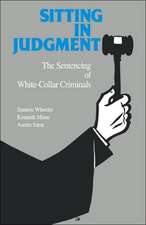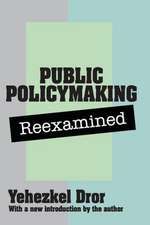On Record: Files and Dossiers in American Life
Autor Stanton Wheeleren Limba Engleză Paperback – 1976
The authors address questions such as: Who determines what records are kept? Who has access to the records? To what extent do the records follow an individual? What are some of the dangers and pitfalls in record-keeping? Throughout the volume, the authors show a concern for an appropriate balance between the need for information about people and protection against undue invasions of privacy. The introduction of electronic databases since the original publication of this book makes the issues raised in this seminal collection even more timely.
Preț: 440.95 lei
Nou
Puncte Express: 661
Preț estimativ în valută:
84.39€ • 87.87$ • 71.32£
84.39€ • 87.87$ • 71.32£
Carte tipărită la comandă
Livrare economică 10-24 martie
Preluare comenzi: 021 569.72.76
Specificații
ISBN-13: 9780878556076
ISBN-10: 0878556079
Pagini: 424
Dimensiuni: 152 x 229 mm
Greutate: 0.57 kg
Ediția:1
Editura: Taylor & Francis
Colecția Routledge
Locul publicării:Oxford, United Kingdom
ISBN-10: 0878556079
Pagini: 424
Dimensiuni: 152 x 229 mm
Greutate: 0.57 kg
Ediția:1
Editura: Taylor & Francis
Colecția Routledge
Locul publicării:Oxford, United Kingdom
Cuprins
Contents
Acknowledgments
The Contributors
I. Introduction
1. Problems and Issues in Record-Keeping
Stanton Wheeler
The Scope of This Volume
Themes and Variations in Record-Keeping
The Policy Issues
II. Educational Institutions
2. Record-Keeping in Elementary and Secondary Schools
David A. Goslin and Nancy Bordier
American Education and Educational Records
The Historical Development of Record-Keeping Procedures
Current Practices
Trends and Future Prospects
Ethical, Legal, and Social Issues
3. The Dossier in Colleges and Universities
Burton R. Clark
The Scope of Record-Keeping
The Primary Central Records
The Varieties of Location and Style
The Varieties of Confidence
Use of the Final Record after College
The Problem of Anticipation
4. Information-Flow within the Professions: Some Selective
Comparisons of Law, Medicine, and Nursing
Rodolfo Alvarez and Wilbert E. Moore
The Profession of Medicine
The Professions of Law and Nursing: General Comparisons to Medicine
General Comparisons among the Professions Summary
III. Economic Institutions
5. The Dossier in Consumer Credit
James Rule, David Caplovitz, and Pierce Barker
How Credit Reporting Works
How Should Credit Reporting Work?
Future Trends and Issues
6. Record-Keeping and Corporate Employees
Ivar Berg and James Salvate
Sources of Information on Managers
Records on Nonmanagerial Personnel
Disclosure of Information on Employees
Implications and Issues in the Use of Corporate Dossiers
Conclusions
7. Personal Information in Insurance Files
H. Laurence Ross
Life Insurance Underwriting
Personal Information in Other Types of Insurance
IV. Governmental Institutions
8. Government Records: The Census Bureau and the Social
Security Administration
Joseph Steinberg
Federal Data Collection
The Bureau of the Census
The Social Security Administration
Government Statistics—A Coordinated System
9. The Dossier in Military Organization
Roger W. Little
Forms of Military Dossiers
Disposition of Records
Issues and Implications
10. Security Investigations
Jesse Orlansky
Federal Personnel Clearance Programs
The Investigative Procedure
Denial of Clearance
Privacy of Information in Dossiers
Appendixes
V. Welfare Institutions
11. Record-Keeping and the Intake Process in a Public Welfare Agency
Don H. Zimmerman
The Setting and Its Tasks
Reception
The Intake Investigation
Documents as Objective and Factual Accounts
Concluding Remarks
12. Records in the Juvenile Court
Edwin M. Lemert
Purposes of Juvenile Court Records
Police and Juvenile Delinquency Records
Making and Using Juvenile Court Records
Consequences of Juvenile Court Records
Dossiers and the "Law Explosion"
13. Case Records in the Mental Hospital
Kai T. Erikson and Daniel E. Gilbertson
Record-Processing
The Patient
Issues of Confidentiality
VI. The Law
14. Legal Control of the Dossier
Abraham S. Goldstein
The Direct Inquiry: Questions to A by B
The Indirect Inquiry: Getting Information from B about A
Getting Information about A from the Government
Striking the Balance
Index
Acknowledgments
The Contributors
I. Introduction
1. Problems and Issues in Record-Keeping
Stanton Wheeler
The Scope of This Volume
Themes and Variations in Record-Keeping
The Policy Issues
II. Educational Institutions
2. Record-Keeping in Elementary and Secondary Schools
David A. Goslin and Nancy Bordier
American Education and Educational Records
The Historical Development of Record-Keeping Procedures
Current Practices
Trends and Future Prospects
Ethical, Legal, and Social Issues
3. The Dossier in Colleges and Universities
Burton R. Clark
The Scope of Record-Keeping
The Primary Central Records
The Varieties of Location and Style
The Varieties of Confidence
Use of the Final Record after College
The Problem of Anticipation
4. Information-Flow within the Professions: Some Selective
Comparisons of Law, Medicine, and Nursing
Rodolfo Alvarez and Wilbert E. Moore
The Profession of Medicine
The Professions of Law and Nursing: General Comparisons to Medicine
General Comparisons among the Professions Summary
III. Economic Institutions
5. The Dossier in Consumer Credit
James Rule, David Caplovitz, and Pierce Barker
How Credit Reporting Works
How Should Credit Reporting Work?
Future Trends and Issues
6. Record-Keeping and Corporate Employees
Ivar Berg and James Salvate
Sources of Information on Managers
Records on Nonmanagerial Personnel
Disclosure of Information on Employees
Implications and Issues in the Use of Corporate Dossiers
Conclusions
7. Personal Information in Insurance Files
H. Laurence Ross
Life Insurance Underwriting
Personal Information in Other Types of Insurance
IV. Governmental Institutions
8. Government Records: The Census Bureau and the Social
Security Administration
Joseph Steinberg
Federal Data Collection
The Bureau of the Census
The Social Security Administration
Government Statistics—A Coordinated System
9. The Dossier in Military Organization
Roger W. Little
Forms of Military Dossiers
Disposition of Records
Issues and Implications
10. Security Investigations
Jesse Orlansky
Federal Personnel Clearance Programs
The Investigative Procedure
Denial of Clearance
Privacy of Information in Dossiers
Appendixes
V. Welfare Institutions
11. Record-Keeping and the Intake Process in a Public Welfare Agency
Don H. Zimmerman
The Setting and Its Tasks
Reception
The Intake Investigation
Documents as Objective and Factual Accounts
Concluding Remarks
12. Records in the Juvenile Court
Edwin M. Lemert
Purposes of Juvenile Court Records
Police and Juvenile Delinquency Records
Making and Using Juvenile Court Records
Consequences of Juvenile Court Records
Dossiers and the "Law Explosion"
13. Case Records in the Mental Hospital
Kai T. Erikson and Daniel E. Gilbertson
Record-Processing
The Patient
Issues of Confidentiality
VI. The Law
14. Legal Control of the Dossier
Abraham S. Goldstein
The Direct Inquiry: Questions to A by B
The Indirect Inquiry: Getting Information from B about A
Getting Information about A from the Government
Striking the Balance
Index
Descriere
On Record provides descriptive accounts of record-keeping in a variety of important organizations: schools and universities; consumer credit agencies, general business organizations, and life insurance companies; military and security agencies; the Census Bureau and the Social Security Administration; public welfare agencies etc


















